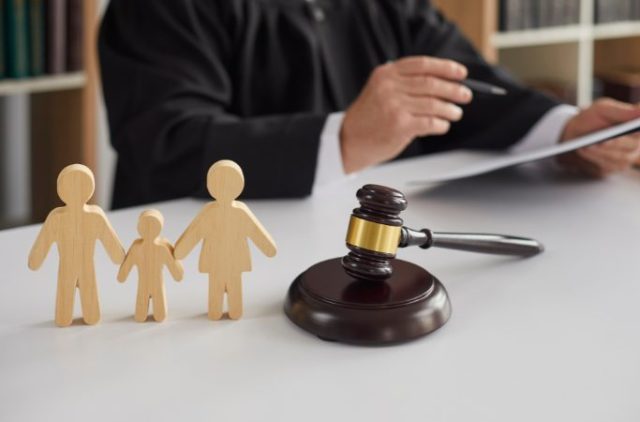Confronting Divorce Stigma: Embracing Post-Divorce Life and Understanding Relationship Endings
By Jordan Blake
January 5, 2025 • Fact checked by Dumb Little Man

In a society where marriage is often idealized, the journey through and beyond divorce can be shrouded in stigma and misunderstanding. This stigma, deeply rooted in cultural and societal norms, paints divorce as a failure or a shameful outcome. However, the truth is that divorce can be a significant turning point, offering opportunities for personal growth, self-discovery, and a chance to pursue a more fulfilling life. It's crucial to understand and confront the stigma surrounding divorce, recognizing it as a part of many people's lives.
Despite the challenges and emotional turmoil, those navigating the divorce process often find themselves embarking on a journey of self-reflection and renewal. This article aims to shed light on the reality of divorce, moving beyond the negative connotations and social stigma. By providing practical advice, emphasizing the importance of emotional support, and discussing ways to maintain mental well-being, it seeks to empower individuals to move forward confidently in their own lives after a divorce. Through understanding and support, we can transform the narrative around divorce from one of shame and failure to one of strength, resilience, and hope for a new chapter.
Understanding Divorce Stigma and Its Impact on Individuals

Divorce, frequently viewed through a lens of failure or taboo, is entangled with a significant stigma. This perception leads to a profound social stigma and self-stigma, where individuals struggle with deep-seated feelings of shame and perceived failure. Exploring the stigma surrounding divorce is crucial in understanding its profound impact on an individual's mental well-being and self-worth. The societal narrative often ignores the complexities and nuances of personal relationships, thereby amplifying these negative feelings.
The weight of this stigma can have far-reaching consequences, not only affecting the individuals going through the divorce but also influencing how they are perceived and treated by others. It's imperative to acknowledge and address these challenges to shift the conversation. By doing so, we can start to dismantle the stigma of divorce and foster a more empathetic and understanding environment, which is essential for healing and moving forward. This section aims to peel back the layers of misconception and bias, offering insights into how we can collectively and individually support those navigating through the divorce process.
Also Read: Divorce Alternatives: Which One Is Right For You?
The Role of Family and Friends in Providing Emotional Support

In the tumultuous journey of divorce, the support of family members and friends emerges as a cornerstone for navigating through this challenging time. Their role is not just crucial but often life-sustaining, providing a necessary buffer against the storm of emotions and decisions. This part of the journey underscores the importance of supportive people who can provide emotional support, acting as a vital lifeline. They help in safeguarding one's overall well-being, offering comfort, understanding, and sometimes, practical help.
The presence of a compassionate and understanding network can significantly reduce stress associated with the divorce process. Their support goes beyond mere companionship; it involves active listening, offering reassurance, and sometimes just being there as a source of stability in a sea of change. Recognizing the value of these relationships, this section highlights the transformative power of empathy and solidarity from loved ones. It illustrates how, in times of personal upheaval, the warmth and understanding of family and friends can illuminate the path towards healing and emotional recovery.
Coping with Divorce: Practical Tips and Self-Care

Navigating through a divorce demands a balanced approach that caters to both physical health and emotional well-being. This segment zeroes in on practical advice and practical tips for individuals to maintain their health during this challenging period. Key aspects like sustaining a healthy diet, ensuring enough sleep, and dedicating time to self-care activities are crucial. A nutritious diet and adequate rest are foundational in managing the physical and emotional strain that often accompanies divorce.
Moreover, self-care emerges as a pivotal element in the journey towards recovery. Activities that foster self-care can vary widely, from exercise and meditation to engaging in hobbies or social activities. These practices not only aid in maintaining physical health but also play a significant role in providing emotional support to oneself. This section aims to guide individuals through incorporating these habits into their daily routines, emphasizing the importance of taking care of oneself. By doing so, it's possible to navigate the divorce process with resilience and emerge with a strengthened sense of well-being.
Legal and Professional Aspects of Divorce

The path through divorce often involves a daunting navigation of the legal system. Understanding the intricate legal process is a critical aspect that can be overwhelming for many. This section highlights the essential need for legal guidance to help navigate these complex waters. Expert advice from attorneys or legal professionals is not just beneficial; it's often indispensable in ensuring fair and equitable outcomes. Issues such as child support and the nuances of single parenting are significant considerations within this process, requiring careful legal examination and understanding.
Moreover, professional counseling plays a pivotal role in managing the emotional and psychological challenges that accompany legal proceedings. This counseling goes beyond the scope of legal advice, offering support and strategies for coping with the stress, anxiety, and emotional turmoil that often accompany divorce. Addressing these emotional aspects is crucial in making informed and rational decisions, especially when it comes to sensitive matters like child custody and personal finances. This section aims to underscore the importance of seeking both legal and emotional support during the divorce process, ensuring that individuals are equipped to handle both the practical and emotional challenges they face.
Challenging Gender Roles and Societal Expectations
Divorce often brings to the forefront the challenge of traditional gender roles and entrenched societal expectations. In this transformative period, both men and women find themselves redefining their roles in a society that has long-held preconceptions about marriage and family dynamics. This section delves into the unique circumstances faced by individuals of different genders as they navigate through the aftermath of a divorce. For women, this may involve tackling stereotypes about single motherhood and financial independence. Men, on the other hand, might confront biases regarding emotional resilience and single parenting.
The process of divorce can be a catalyst for questioning and, ultimately, reshaping these gender roles. It offers an opportunity for both men and women to explore new identities and responsibilities free from the constraints of traditional expectations. This exploration is not without its challenges, as societal norms can be deeply ingrained and difficult to overcome. However, by addressing these issues head-on, this section aims to highlight the evolving nature of gender roles in the context of divorce. It underscores the importance of recognizing and supporting the diverse experiences and societal pressures faced by individuals as they reconstruct their lives post-divorce.
The Role of Professional Help in Overcoming Divorce-Related Challenges

Dealing with the complexities of ending a relationship involves more than just legal and financial considerations; it deeply affects one's emotional and psychological state. This section emphasizes the crucial role of counselors and therapists in providing support and guidance. These professionals offer a safe space for individuals to cope with their feelings, process their concerns, and work through the myriad challenges associated with the end of a relationship.
Therapists and counselors are skilled in helping individuals navigate the tumultuous waters of emotional distress that divorce can bring. They offer strategies and tools for managing stress, dealing with grief, and rebuilding self-esteem. This support is invaluable in helping people move forward, providing them with the resilience and coping mechanisms needed to face new beginnings. By highlighting the benefits of professional counseling, this section aims to encourage individuals going through a divorce to seek out and embrace the support available to them, acknowledging the significant role it plays in healing and personal growth.
Conclusion
In conclusion, transforming the narrative around divorce involves shedding light on its complexities and moving beyond the traditional stigma associated with it. This article has explored various facets, from the importance of emotional support and legal guidance, to challenging gender roles and societal norms. The key takeaway is to perceive divorce not as a failure, but as an opportunity for personal growth and a step towards a more authentic and fulfilling life.
Encouraging a shift in societal attitudes is essential for those navigating through divorce. By fostering an environment of understanding and support, we can help diminish the stigma of divorce, allowing individuals to embark on their new journeys with confidence and hope. It's time to embrace a more compassionate and realistic view of divorce, recognizing it as a part of life's journey for many and a chance for renewal and transformation.
Also Read: What Should a Woman Ask For in a Prenup?
FAQs: Confronting Divorce Stigma
How can I cope with the stigma surrounding divorce?
To cope with the stigma surrounding divorce, it's important to seek emotional support from friends, family, or professional counselors. Engaging in self-care activities and focusing on personal growth can also help in overcoming societal judgments and self-stigma.
What role do family and friends play during the divorce process?
Family and friends play a crucial role during the divorce process by providing emotional support, understanding, and practical help. Their presence can significantly reduce stress and help maintain overall well-being.
Is it necessary to seek professional help during divorce?
Yes, seeking professional help from counselors or therapists is highly beneficial during a divorce. They provide strategies for coping with emotional stress, offer guidance through the legal aspects, and support in dealing with the challenges of relationship endings.
Jordan Blake
Jordan Blake is a cultural commentator and trending news writer with a flair for connecting viral moments to the bigger social picture. With a background in journalism and media studies, Jordan writes timely, thought-provoking content on everything from internet challenges and influencer scandals to viral activism and Gen Z trends. His tone is witty, observant, and sharp—cutting through the noise to bring readers the “why” behind the “what.” Jordan’s stories often go deeper than headlines, drawing links to pop culture, identity, and digital behavior. He’s contributed to online media hubs and social commentary blogs and occasionally moderates online panels on media literacy. When he’s not chasing the next big trend, Jordan is probably making memes or deep-diving into Reddit threads. He believes today’s trends are tomorrow’s cultural history—and loves helping readers make sense of it all.






